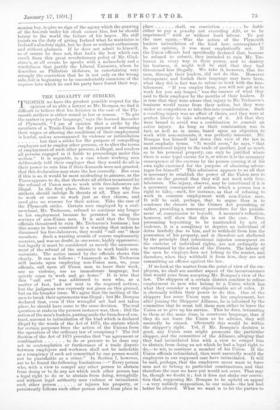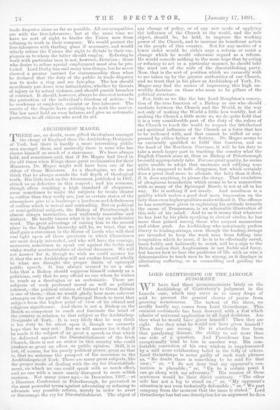THE LEGALITY OF STRIKES.
THOUGH we have the greatest possible respect for the opinion of so able a lawyer as Mr. Bompas, we find it difficult to believe that his decision in the case of the Ply- mouth strikers is either sound in law or reason. " To put the matter in popular language," says the learned Recorder of Plymouth, " I am of opinion that a strike by the members of a Trade-Union for the purpose of increasing their wages or altering the conditions of their employment is lawful, unless accompanied by violence or intimidation but that a strike for the purpose of compelling employers not to employ other persons, or to alter the terms of employment of such other persons, is illegal, and renders all persons engaged in it liable to proceedings under this section." It is arguable, in a case where working men deliberately told their employer that they would do all in their power to ruin him if their demands were not granted, that this declaration may state the law correctly. But even if this is so, it would be most misleading to Assume, as the Times appears to do, that therefore all strikes occasioned by the refusal of Union men to work with free-labourers are illegal. In the first place, there is no reason why the strikers should indulge fn threats at all. They are free to work or cease to work just as they choose, and need give no reasons for their action. Take the case of the Plymouth strike. Certain men employed by a coal- merchant, Mr. Treleaven, refused to continue any longer in his employment because he persisted in using the services of non-Union men. It is said that the Union officials threatened to ruin Mr. Treleaven's business ; but this seems to have consisted in a warning that unless he dismissed his free-labourers, they would " call out " their members. Such a warning sounds of course unpleasantly coercive, and was no doubt, in one sense, highly oppressive ; but legally it must be considered as merely the announce- ment of the refusal of the unionists to work beside non- unionists. The notice issued by the officials shows this clearly. It ran as follows " Inasmuch as Mr. Treleaven still insists upon employing non-Union men, we, your officials, call upon all Union men to leave their work, use no violence, use no immoderate language, but quietly cease to 'work and go home." It is true that this " call out " was addressed to men who, as a matter of fact, had not sent in the required notices ; but the judgment was expressly not given on this ground, but on the broader issue. We agree that the inciting of the men to break their agreements was illegal ; but Mr. Bompas declared that, even if this wrongful act had not taken place, he should have come to the same decision. The real question at stake in the present instance was, then : Did the action of the men's leaders, putting aside the breaches of con- tract, amount to intimidation of the kind which is declared illegal by the words of the Act of 1875, the statute which for certain purposes frees the action of the Unions from the operation of the ordinary law of conspiracy ? The 3rd Section of the Act of 1875 provides that " an agreement or combination to do or procure to be done any act in contemplation or furtherance of a trade dispute between employers and workmen shall not be indictable as a conspiracy if such act committed by one person would not be punishable as a crime." In Section 7, however, are to be found the following limitations :—" Every person who, with a view to compel any other person to abstain from doing or to do any act which such other person has a legal right to do or to abstain from doing, wrongfully and without legal authority uses violence or intimidates such other person or injures his property, or persistently follows such other person about from place to place shall, on conviction be liable either to pay a penalty not exceeding £20, or to be imprisoned " with or without hard labour. To put the case again,—Was the action of the Plymouth leaders intimidation of the kind here contemplated ? In our opinion, it was most emphatically not. If the Union officials had specifically declared that, because he refused to submit, they intended to ruin Mr. Tre- leaven in every way in their power, and to destroy his business, it might well be said that they had threatened him illegally. We take it, however, that the men, through their leaders, did not do this. However intemperate and foolish their language may have been, what they did in fact was to refuse to work with the free- labourers. " If you employ them, you will not get us to work for you any longer," was the essence of what they said to their employer by the mouths of their leaders. It is true that they were aware that injury to Mr. Treleaven's business would ensue from their action, but they were under no compulsion to take this into consideration. Such a resulting injury was no affair of theirs, and they were at perfect liberty to take advantage of it. All that they were bound to avoid was a combination to commit an active injury. As long as their combination was in fact, as well as in name, based upon an objection to work with non-unionists, it was perfectly innocent. Mr. Bompas has himself laid down this view of the law in most emphatic terms. "It would seem," he says, "that an intentional injury to the trade of another, just as much as to his personal property, can only be justified where there is some legal excuse for it, or where it is the necessary consequence of the exercise by the person causing it of his own right exercised for the purpose of obtaining advan- tages for himself." This admission appears to us all that is necessary to establish the power of the Union men to strike on the ground that they will not work with free-. labourers. The injury, observe, may be intentional if it is a necessary consequence of action which a person has a right to take,—such, for instance, as that of refusing to in common employment with non-Union men., It will be said, perhaps, that to argue thus is to condemn the clauses in the Crimes Act punishing, or rather, providing a summary procedure for the punish- ment of, conspiracies to boycott. A moment's reflection, however, will show that this is not the ease. Even presuming boycotting to be unattended by acts of violence, it is a conspiracy to deprive an individual of debts lawfully due to him, and to withhold from him the possession of his property, and is therefore not sheltered by the principle that intentional injuries consequent on the exercise of individual rights, are not ordinarily to be restrained' by the action of the Courts. The labour of the men he employs does not belong to the master, and therefore, when they withhold it from him, they are not committing an offence against the law.
If we look at the matter from the point of view of the em- ployers, we shall see another aspect of the inconveniences that would arise from accepting Mr. Bompas's view of the law. The shippers of a certain district combine to refuse employment to men who belong to a Union which has what they consider a very objectionable set of rules. It is obviously within their power to do this. One of the• shippers has some Union men in his employment, but after joining the Shippers' Alliance, he is informed by the committee that he must tell these men either to leave the Union or to give up his service. This he does, intimating to them at the same time, in courteous language, that if they do not leave the Union as he advises, they will assuredly be ruined. Obviously this would be within the shipper's right. Yet, if Mr. Bompas's decision is• good, any Union man might prosecute the particular shipper, and the committee of the Alliance, alleging that they had intimidated him with a view to compel him to abstain from doing an act which he had a legal right to do,—to wit, to continue a member of his Union. If the Union officials intimidated, then most assuredly would the employers in our supposed case have intimidated. It will be said, perhaps, that the employers never want to force men not to belong to particular combinations, and that therefore the case we have put would not occur. That may be, though we doubt it ; but it does not shake our convic- tion that, supposing Mr. Bompas to be upheld on appeal —a very unlikely supposition, to our minds—the law had better be altered. What we want is to let the parties to trade disputes alone as far as possible. All our sympathies are with the free-labourers; but at the same time we have no sort of right to hinder the Union men from refusing to work in their company. We would protect the free-labourers with Gatling guns if necessary, and would utterly refuse the Unions the right to dictate to their em- ployers as to whom the latter should employ. Refusing to work with particular men is not, however, dictation ; those who desire to refuse special employment must also be pro- tected. Lord Derby has said many wise things, but be never showed a greater instinct for statesmanship than when he declared that the duty of the public in trade disputes was to make a ring and see fair-play. The law should mercilessly put down true intimidation, whether by threats of injury or by actual violence, and should punish breaches of contract. It should, however, always be directed towards the protection of .the individual's freedom of action,—be ho workman or employer, unionist or free-labourer. The merits of the dispute have nothing to do with the matter. The law must hold an even balance, and give an automatic protection to all citizens who need its aid.







































 Previous page
Previous page